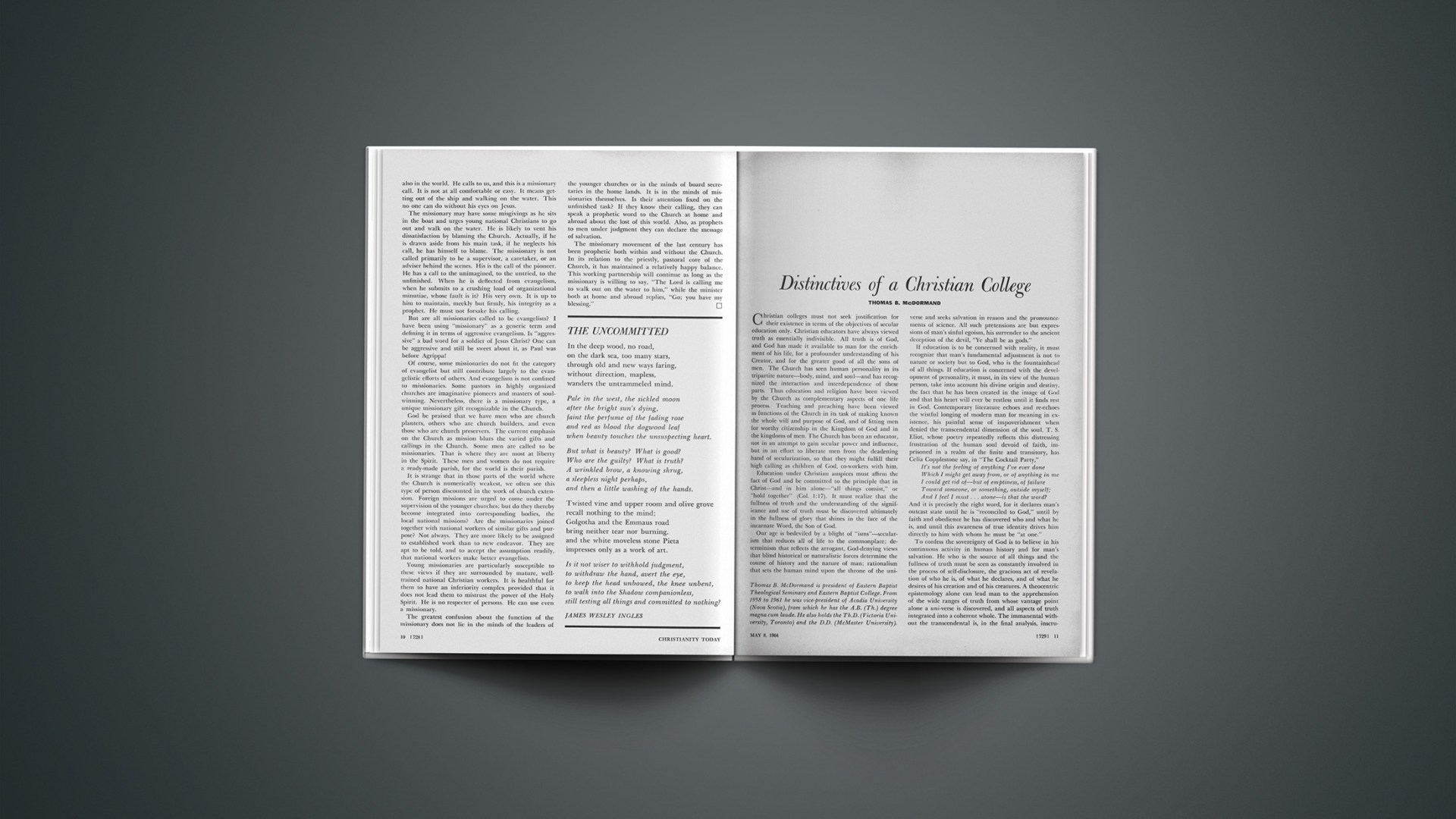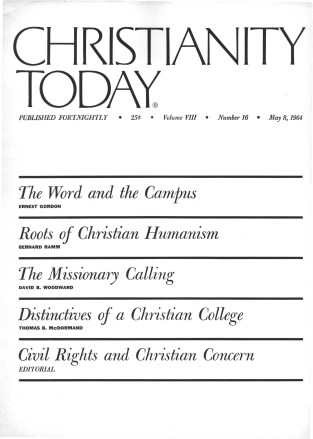Christian colleges must not seek justification for their existence in terms of the objectives of secular education only. Christian educators have always viewed truth as essentially indivisible. All truth is of God, and God has made it available to man for the enrichment of his life, for a profounder understanding of his Creator, and for the greater good of all the sons of men. The Church has seen human personality in its tripartite nature—body, mind, and soul—and has recognized the interaction and interdependence of these parts. Thus education and religion have been viewed by the Church as complementary aspects of one life process. Teaching and preaching have been viewed as functions of the Church in its task of making known the whole will and purpose of God, and of fitting men for worthy citizenship in the Kingdom of God and in the kingdoms of men. The Church has been an educator, not in an attempt to gain secular power and influence, but in an effort to liberate men from the deadening hand of secularization, so that they might fulfill their high calling as children of God, co-workers with him.
Education under Christian auspices must affirm the fact of God and be committed to the principle that in Christ—and in him alone—“all things consist,” or “hold together” (Col. 1:17). It must realize that the fullness of truth and the understanding of the significance and use of truth must be discovered ultimately in the fullness of glory that shines in the face of the incarnate Word, the Son of God.
Our age is bedeviled by a blight of “isms”—secularism that reduces all of life to the commonplace; determinism that reflects the arrogant, God-denying views that blind historical or naturalistic forces determine the course of history and the nature of man; rationalism that sets the human mind upon the throne of the universe and seeks salvation in reason and the pronouncements of science. All such pretensions are but expressions of man’s sinful egoism, his surrender to the ancient deception of the devil, “Ye shall be as gods.”
If education is to be concerned with reality, it must recognize that man’s fundamental adjustment is not to nature or society but to God, who is the fountainhead of all things. If education is concerned with the development of personality, it must, in its view of the human person, take into account his divine origin and destiny, the fact that he has been created in the image of God and that his heart will ever be restless until it finds rest in God. Contemporary literature echoes and re-echoes the wistful longing of modern man for meaning in existence, his painful sense of impoverishment when denied the transcendental dimension of the soul. T. S. Eliot, whose poetry repeatedly reflects this distressing frustration of the human soul devoid of faith, imprisoned in a realm of the finite and transitory, has Celia Copplestone say, in “The Cocktail Party,”
It’s not the feeling of anything I’ve ever done
Which I might get away from, or of anything in me
I could get rid of—but of emptiness, of failure
Toward someone, or something, outside myself;
And I feel I must … atone—is that the word?
And it is precisely the right word, for it declares man’s outcast state until he is “reconciled to God,” until by faith and obedience he has discovered who and what he is, and until this awareness of true identity drives him directly to him with whom he must be “at one.”
To confess the sovereignty of God is to believe in his continuous activity in human history and for man’s salvation. He who is the source of all things and the fullness of truth must be seen as constantly involved in the process of self-disclosure, the gracious act of revelation of who he is, of what he declares, and of what he desires of his creation and of his creatures. A theocentric epistemology alone can lead man to the apprehension of the wide ranges of truth from whose vantage point alone a uni-verse is discovered, and all aspects of truth integrated into a coherent whole. The immanental without the transcendental is, in the final analysis, inscrutable. The knowledge of God crowns all other knowledge, interpreting and coordinating it in enduring depth.
Man’s best knowledge and noblest experience repudiate any out-and-out rationalism, any materialistic determinism, any pathetic insistence upon the ultimacy of the “things of this world.” The gods we fashion with our own hands as projections of our sinful human hearts have no power to teach or to save us. If education is “a preparation for life,” it must relate itself to the true nature of human personality and to the principles of life that are built into the nature of things. To ignore the truth that comes from God is to injure oneself in futile, presumptuous efforts to ignore or change the unchanging purposes of him who rules all things.
Thus the truth that comes by revelation, apprehended by the faculty of faith, must crown the educative process in Christian colleges.
Our age suffers from the attempt to alienate faith from reason, to deny faith as a faculty for the apprehension of truth significant for human welfare. Much of the secularism of our time derives from this misguided epistemological approach. The dichotomy is, of course, an old one. Thomas Aquinas fought a battle for us all in his philosophical attempt to reconcile faith and science, reason and revelation. The contemporary revival of Thomism will not meet the epistemological need of our time, but it challenges the Christian college to deal vigorously and deeply with the pretensions of a secular world and an arrogant intellectualism.
Reason Without Vision
Certainly reason devoid of faith, reason reduced to a two-dimensional world, reason without a soul, is tragically limited. It lacks the wings of vision. It lacks the richest motivations and the most satisfying rewards. It lacks a continuity and a principle of integration without which intellectual inquiry would, in the long view, be reduced in “height, and depth, and length and breadth.” “Without faith it is impossible to please God”—or ultimately man—in the classroom, in the laboratory, or in the functioning of life itself. It is when man’s reason and God’s revelation meet in a glorious marriage in faith that truth in its many-splendored nature is most quickly perceived and most humbly and worthily applied for the benefit of the children of God. The eye of faith can add richly to that which the eye of flesh beholds in every field of human inquiry. Here is found one of the greatest justifications for Christian institutions of higher learning. Reason alone cannot, as Descartes held, discern the ultimate principles by which “the edifice of knowledge can be built.” Hence the Christian college relates reason and revelation without apology.
The nature of man derives from the nature of God and inheres in the divine nature. Consequently man’s capacities must be developed so that he may fulfill his destiny and serve the fundamental needs of his society. Christian education relates primarily to persons rather than to subject matter, and its success is to be determined in terms of the kind of persons it produces.
Basic to the task of a Christian college is its commitment to the purpose of producing people who are spiritually as well as intellectually developed. If man has a soul as well as a body, then the developmental process to which education addresses itself must include concern for spiritual development and for the total functioning of personality in its total environment—an environment that involves God and people, the world visible and invisible, the here and now and the hereafter, and responsibilities dictated by moral and ethical principles having historical continuity and divine sanction.
The Fine Art Of Living
Christianity makes man the supreme object of the divine love and the most significant element in the complex of life. The gift of Christ for man’s redemption from the forces that would first downgrade and then destroy him, graciously and gloriously reveals the worth of human personality. The Christian college insists that to knowledge must be added wisdom; to vocational competence must be added skill in the fine art of living; to facts must be added an understanding of the attitudes and relations that produce happiness for the person and the highest welfare of those whom his life touches. A man is essentially a monstrosity if he is intellectually alert but morally dull and insensate; if he is well equipped for a vocation but ill equipped to live happily with people and usefully as a member of society; if he is skilled in asking questions but deeply disturbed because he knows no fundamental answers. The Christian college believes that knowing how to live is just as important as knowing how to make a living.
There is only One who knows the end from the beginning; only One who can correlate all the diverse events of time in conformity to a unifying principle, an overarching purpose. To Christian faith such biblical terms as eschatos, kairos, and teleos declare the fact that the events of the passing hour are determined by the ultimate purposes of God for his people and his world. They are determined, not by economic or sociological forces inherent in the process of history, but by divinely ordered principles that are beyond the passing moment and outside the temporal scene. History is “His story” in very truth, and can be interpreted aright only in the light of a knowledge of His providential grace and truth. “Things present and things to come” can be interpreted only by those who are not “separated from the love of God in Christ Jesus, our Lord.” The Lord of history is the “God of our salvation,” so that only the redeemed in him can view with equanimity the chaotic events of any period of history and say, “None of these things move me,” because “the Lord God omnipotent reigneth.”
Such faith saves reason from blind despair. Such faith must inform the best teaching of history, philosophy, literature, science, and the social sciences. The fundamental unity of all knowledge comes to light in applying this principle of historical continuity and coherence. It demands that every great teacher be to some extent a theologian, and that theological convictions constitute the unitive principles of interdisciplinary interdependence.
Thomas B. McDormand is president of Eastern Baptist Theological Seminary and Eastern Baptist College. From 1958 to 1961 he was vice-president of Acadia University (Nova Scotia), from which he has the A.B. (Th.) degree magna cum laude. He also holds the Th.D. (Victoria University, Toronto) and the D.D. (McMaster University).










